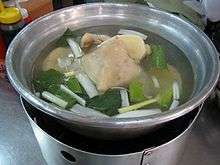Baeksuk
 | |
| Place of origin | Korea |
|---|---|
| Main ingredients | Meat (including fish and poultry meat) |
|
| |
| Korean name | |
| Hangul | 백숙 |
|---|---|
| Hanja | 白熟 |
| Revised Romanization | baeksuk |
| McCune–Reischauer | paeksuk |
| IPA | [pɛ̝k̚.s͈uk̚] |
Baeksuk (백숙; 白熟) is a Korean culinary term referring to dishes made by boiling or steaming meat or fish to be cooked thoroughly without seasonings.[1] Baeksuk is made with chicken or pheasant with plenty of water for several hours. However, the term generally indicates dakbaeksuk (닭백숙, chicken baeksuk), or chicken stew, whose recipe and ingredients are similar to samgyetang. While samgyetang is made with ginseng, various herbs, chestnuts, and jujubes, dakbaeksuk consists of simpler ingredients, such as chicken, water, and garlic. The chicken can be stuffed with glutinous rice.
When the cooking is finished, salt and sliced Welsh onions (daepa, 대파) are added to the diner's bowl according to taste.[2] If the baesuk is not stuffed with glutinous rice, it is usually eaten with cooked rice. It is often seen as a simpler and cheaper variant of samgyetang. Sometimes it is mistakenly used as another word for samgyetang.
Dak hanmari

The dak hanmari (닭한마리) is a popular South Korean dish to have developed from baeksuk, which is said to originate in Dongdaemun area, Seoul since the 1960s. The dish literally means "a whole chicken" in Korean because diners can have several types of food altogether from a chicken; chicken flesh, its rich soup, kalguksu, potatoes, and garaetteok (cylinder-shaped rice cake). It can be eaten with a clear broth just like baeksuk, or seasoned with gochujang (chili pepper paste) based sauce.[3]
References
| Wikimedia Commons has media related to Baeksuk. |
- ↑ 백숙 (白熟) (in Korean). Empas Korean Dictionary. Retrieved 2008-06-21.
- ↑ 닭백숙 (in Korean). Doosan Encyclopedia. Retrieved 2008-06-21.
- ↑ Hwang Gyo-ik (황교익) (2007-07-10). 그래, 이 맛이야!|닭백숙 (in Korean) (593). Weekly Dong-a.
External links
- (in Korean) General info on baeksuk